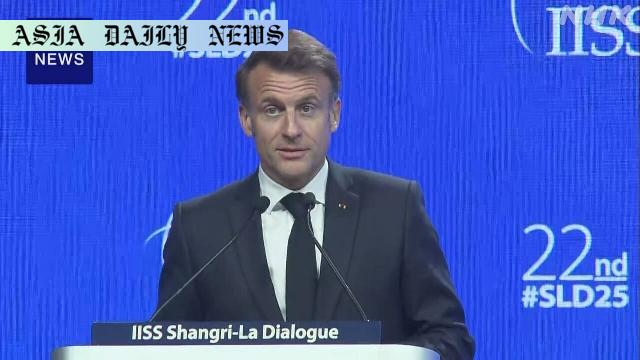Europe-Asia Cooperation: Macron highlights the need for collaborative efforts to stabilize the rules-based global order.
- Key Point 1: Macron emphasizes the necessity of Europe-Asia collaboration for stabilizing the global system.
- Key Point 2: Stresses the risks posed by the U.S.-China competition to international equilibrium.
- Key Point 3: Advocated for open trade, new coalitions, and constructive dialogue.

Macron Stresses the Importance of Europe-Asia Cooperation
The French President Emmanuel Macron, during his keynote speech at the Shangri-La Dialogue hosted in Singapore, highlighted Asia’s geopolitical significance in ensuring a stable rules-based global order. Macron’s speech strongly emphasized the fundamental collaboration between Europe and Asia to champion peace, open dialogue, and sustainable international trade. The Shangri-La Dialogue served as an ideal platform for Macron to address matters of global concern, considering the forum’s reputation for being a confluence of some of the world’s leading defense and political minds, addressing security dynamics critical to the 21st century.
During his address, Macron delved into the challenges arising from the escalating tension between the United States and China. He asserted that their competition for global leadership poses immense risks to the international community, creating uncertainties in global markets and destabilizing regional alliances. Macron’s pointed references to economic policies, notably tariffs introduced under the Trump administration, reflect his discontent with recent protectionist trends. Simultaneously, he emphasized the direct consequences of regional conflicts, such as Russia’s invasion of Ukraine, as factors disrupting global harmony. His proposition is simple yet powerful: nations across continents must form coalitions to counteract these trends, relying on openness and collaboration as essential tools for preserving the international order.
China’s Role in Regional Tensions
Macron perceptively recognized China’s growing assertiveness in regions like the South China Sea and Taiwan, warning of its implications on the security dynamics of Asia and the world. While he refrained from explicitly criticizing China’s policies, his statements underscored the necessity of engaging Beijing constructively. Macron also acknowledged Asia’s evolving political and economic order and advocated for maintaining balance through collaborative global stewardship. The importance of a united European and Asian response to Beijing’s policies cannot be underestimated according to Macron — his argument is that collective unity is a bulwark against unilateralism affecting Asia.
Proposals for Open Trade and Coalitions
The heart of Macron’s argument leaned on introducing new coalitions. These coalitions, he posited, must prioritize open trade policies and a consistent framework for transparent, rules-based governance. Europe, as a historical advocate for diplomacy and alliances, has a significant role to play in strengthening freight logistics, global supply chains, and diplomatic ties with Asia. Macron stressed that protectionism—referring here to Trump-era tariffs—becomes an insidious vehicle through which global interconnectedness dismantles. Furthermore, with the Russia-Ukraine conflict spiraling, Europe’s strengthened economic partnership with Asia isn’t just advisable—but mandatory.
A Call to Action for the Global Community
Macron concluded his speech with an emphatic call to the global community, advocating for continuous dialogue amidst the turbulence of geopolitical shifts. Emphasizing the cornerstone of peace and respect between nations, Macron insisted on mutual trust across continents. His vision beckons Asia toward common grounds, tackling climate challenges, reformulating obsolete trade/political treaties, and embarking on an innovative, modern framework. This persuasive direction towards multilateralism resonated profoundly with attendees observing the United States’ future tone—a forthcoming speech penned by Pete Hegseth foreshadowing America’s Asia Policy is equally awaited.



Commentary
Macron’s Vision: A Critical Step Towards Harmonized Global Order
French President Emmanuel Macron’s speech at the Shangri-La Dialogue is a significant statement reflecting leadership aimed at bridging continental boundaries. By emphasizing Europe and Asia’s collaborative efforts, Macron reinforces that intercontinental diplomacy is critical in tackling present and emerging global challenges. With two political giants—the United States and China—locked in increasing tensions, Macron rightly calls for the balanced approach through unity that intercontinental discourse advocates.
International Risks and Their Implications
Macron’s focus on the consequences of the U.S.-China competition is profoundly insightful. From economic ripples affecting markets worldwide to military assertions in the South China Sea—these factors weigh heavily on peace. Through his measured critique of protectionist policies and recognition of regional instabilities such as Russia’s invasion of Ukraine, Macron clearly highlights the chain reactions endangering every stakeholder. By engaging calmly amidst this fiery global rhetoric battle—his speech deserves applause.
Europe’s Role Beyond Borders
Perhaps the most vital aspect of Macron’s dialogue is Europe stepping purposefully onto Asia’s platform. Often considered geographically peripheral, Europe’s reinforced standing per his proposal emphasizes unity overcoming competition. Considering industry/market conditions where multilateral choice drivers matter relentlessly—posit any significant slowdown involving Asian economies requiring Europe amplifying outright.